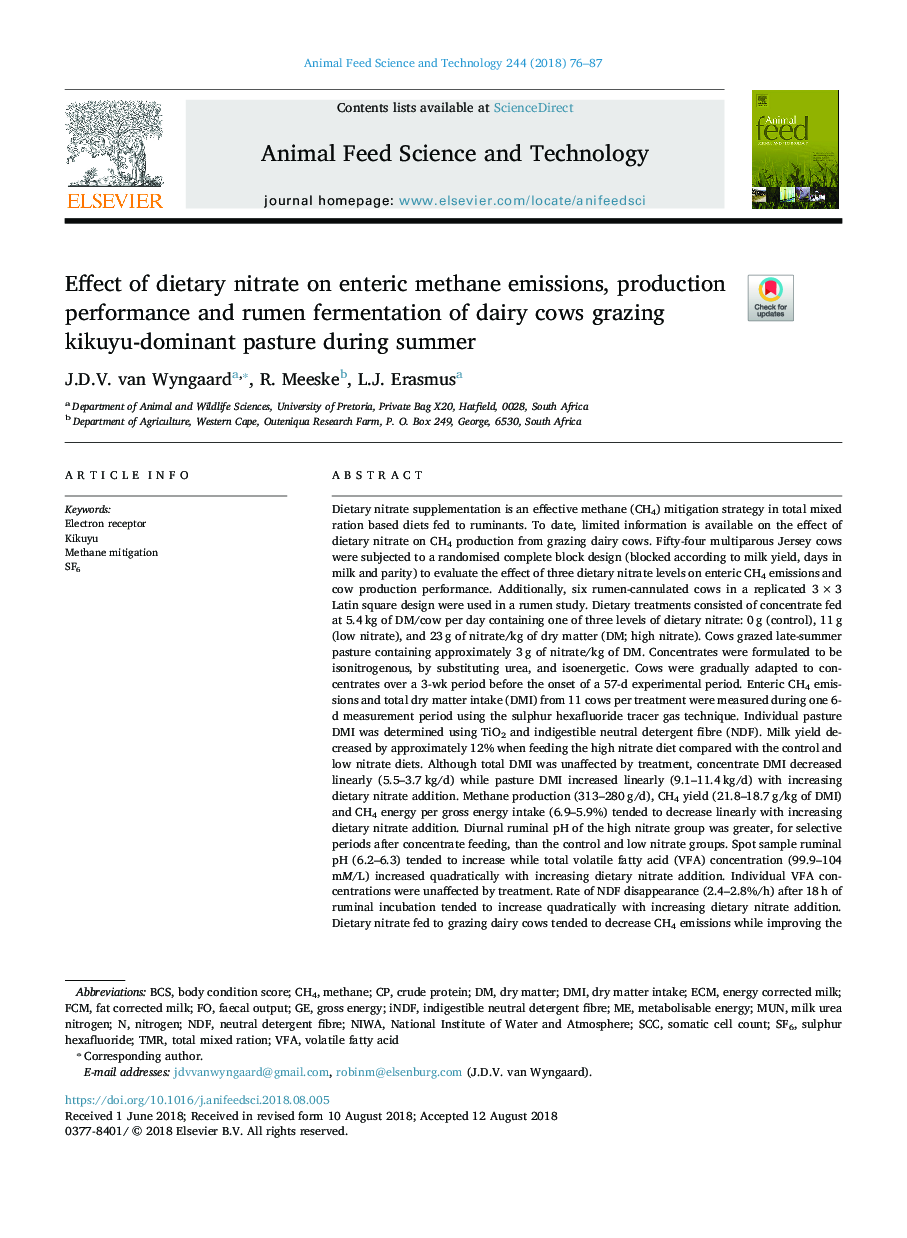| کد مقاله | کد نشریه | سال انتشار | مقاله انگلیسی | نسخه تمام متن |
|---|---|---|---|---|
| 8490889 | 1552342 | 2018 | 12 صفحه PDF | دانلود رایگان |
عنوان انگلیسی مقاله ISI
Effect of dietary nitrate on enteric methane emissions, production performance and rumen fermentation of dairy cows grazing kikuyu-dominant pasture during summer
ترجمه فارسی عنوان
اثر نیتروژن بر رژیم غذایی بر تولید گازهای گلخانهای متان، عملکرد تولید و تخمیر شکماری گاوهای شیری که در طی تابستان کشته شدند
دانلود مقاله + سفارش ترجمه
دانلود مقاله ISI انگلیسی
رایگان برای ایرانیان
کلمات کلیدی
ECMKikuyuNIWATMRNDFCH4SCCMUNVFAMethane mitigationFCMSF6DMIiNDF - Indfvolatile fatty acid - اسید چرب فرارenergy corrected milk - انرژی تصحیح شیرmetabolisable energy - انرژی قابل متابولیسمgross energy - انرژی ناخالصSomatic cell count - تعداد سلول های سوماتیکFaecal output - خروجی فکBCs - روند BCsindigestible neutral detergent fibre - فیبر مواد شوینده بی حس کنندهneutral detergent fibre - فیبر مواد شوینده خنثیdry matter - ماده خشکMethane - متان dry matter intake - مصرف ماده خشکBody condition score - نمره وضعیت بدنNitrogen - نیتروژنMilk urea nitrogen - نیتروژن اورهSulphur hexafluoride - هگزافلورید سولفوریکcrude protein - پروتئین خامfat corrected milk - چربی اصلاح شده شیرtotal mixed ration - کل جیره مخلوط شده
موضوعات مرتبط
علوم زیستی و بیوفناوری
علوم کشاورزی و بیولوژیک
علوم دامی و جانورشناسی
چکیده انگلیسی
Dietary nitrate supplementation is an effective methane (CH4) mitigation strategy in total mixed ration based diets fed to ruminants. To date, limited information is available on the effect of dietary nitrate on CH4 production from grazing dairy cows. Fifty-four multiparous Jersey cows were subjected to a randomised complete block design (blocked according to milk yield, days in milk and parity) to evaluate the effect of three dietary nitrate levels on enteric CH4 emissions and cow production performance. Additionally, six rumen-cannulated cows in a replicated 3âÃâ3 Latin square design were used in a rumen study. Dietary treatments consisted of concentrate fed at 5.4âkg of DM/cow per day containing one of three levels of dietary nitrate: 0âg (control), 11âg (low nitrate), and 23âg of nitrate/kg of dry matter (DM; high nitrate). Cows grazed late-summer pasture containing approximately 3âg of nitrate/kg of DM. Concentrates were formulated to be isonitrogenous, by substituting urea, and isoenergetic. Cows were gradually adapted to concentrates over a 3-wk period before the onset of a 57-d experimental period. Enteric CH4 emissions and total dry matter intake (DMI) from 11 cows per treatment were measured during one 6-d measurement period using the sulphur hexafluoride tracer gas technique. Individual pasture DMI was determined using TiO2 and indigestible neutral detergent fibre (NDF). Milk yield decreased by approximately 12% when feeding the high nitrate diet compared with the control and low nitrate diets. Although total DMI was unaffected by treatment, concentrate DMI decreased linearly (5.5-3.7âkg/d) while pasture DMI increased linearly (9.1-11.4âkg/d) with increasing dietary nitrate addition. Methane production (313-280âg/d), CH4 yield (21.8-18.7âg/kg of DMI) and CH4 energy per gross energy intake (6.9-5.9%) tended to decrease linearly with increasing dietary nitrate addition. Diurnal ruminal pH of the high nitrate group was greater, for selective periods after concentrate feeding, than the control and low nitrate groups. Spot sample ruminal pH (6.2-6.3) tended to increase while total volatile fatty acid (VFA) concentration (99.9-104 mM/L) increased quadratically with increasing dietary nitrate addition. Individual VFA concentrations were unaffected by treatment. Rate of NDF disappearance (2.4-2.8%/h) after 18âh of ruminal incubation tended to increase quadratically with increasing dietary nitrate addition. Dietary nitrate fed to grazing dairy cows tended to decrease CH4 emissions while improving the fibrolytic environment of the rumen. However, when feeding high levels of dietary nitrate a decrease in milk yield could be expected due to a decrease in concentrate DMI.
ناشر
Database: Elsevier - ScienceDirect (ساینس دایرکت)
Journal: Animal Feed Science and Technology - Volume 244, October 2018, Pages 76-87
Journal: Animal Feed Science and Technology - Volume 244, October 2018, Pages 76-87
نویسندگان
J.D.V. van Wyngaard, R. Meeske, L.J. Erasmus,
